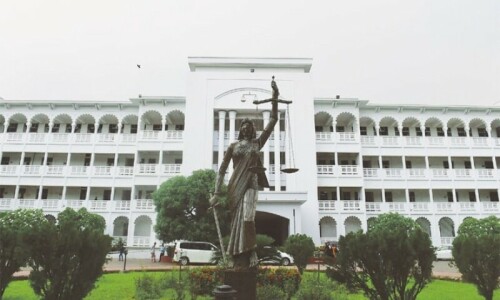NEW DELHI: Indian Prime Minister Narendra Modi offered support on Friday to the interim leader of Bangladesh, who took power after prime minister Sheikh Hasina’s ouster on August 5.
The comments were made following a phone call between Modi and Bangladesh’s Nobel laureate Muhammad Yunus, who is heading the caretaker administration formed after Hasina fled to India.
Her fall has raised concerns in New Delhi, which has key investments and close security ties with its eastern neighbour.
Modi “reaffirmed India’s support for democratic, stable, peaceful and progressive Bangladesh”, the foreign ministry said in a statement.
Hasina’s 15-year rule saw widespread human rights abuses, including the mass detention and extra-judicial killings of her political opponents.
But Modi’s government preferred Hasina over her rivals from the Bangladesh Nationalist Party, which it saw as closer to Islamist groups.
In the immediate aftermath of Hasina’s fall, attacks on Hindus across Bangladesh were reported. The security situation has since far improved.
Hindus are the largest minority faith in Bangladesh and were considered a steadfast support base for Hasina’s party, the Awami League.
Modi “underlined the importance of ensuring the safety and protection of Hindus and all other minority communities in Bangladesh”, India’s foreign ministry said.
Bangladesh’s new interim government has already said it is committed to restoring law and order and to protect all minorities.
Another general joins government
A second retired military general was sworn into Bangladesh’s interim government on Friday, one of four new additions to the caretaker administration formed after the ouster of Sheikh Hasina.
Jahangir Alam Chowdhury, 71, and three others joined the “council of advisers”, the de facto cabinet now running Bangladesh under the leadership of Muhammad Yunus.
Chowdhury was a three-star general and second-in-command of the army, but retired in 2010 — the year after Hasina took office.
The two had butted heads in the aftermath of a savage mutiny by troops against senior military officers that raised fears of a power struggle between the armed forces and the government.
The 2009 mutiny killed 74 people over two days, including 57 senior officers, some of whom were hacked to death or burned alive before their bodies were dumped in sewers or shallow graves.
More than 150 soldiers were sentenced to death in 2013 for participating in the uprising, which began partly in anger that their pleas for better pay and treatment had been ignored.
Their trials were criticised for procedural irregularities and claims that the defendants were tortured while in custody, which Hasina’s government denied.
Chowdhury was tasked with leading a “neutral” army probe into the mutiny soon after it occurred, competing with a rival investigation already set up by Hasina’s administration.
Also sworn in on Friday were former cabinet secretary Ali Imam Majumder, Cambridge-educated economist Wahiduddin Mahmud, and infrastructure expert Fouzul Kabir Khan.
Published in Dawn, August 17th, 2024














































Dear visitor, the comments section is undergoing an overhaul and will return soon.